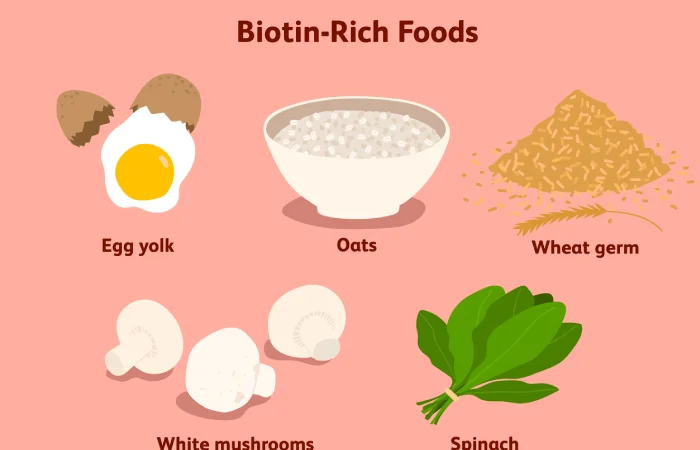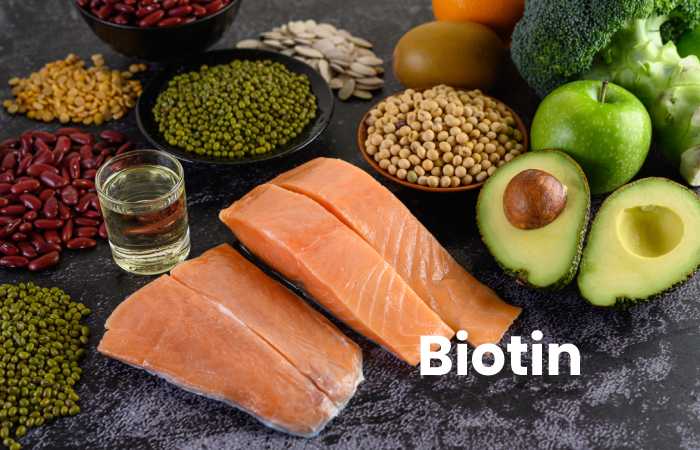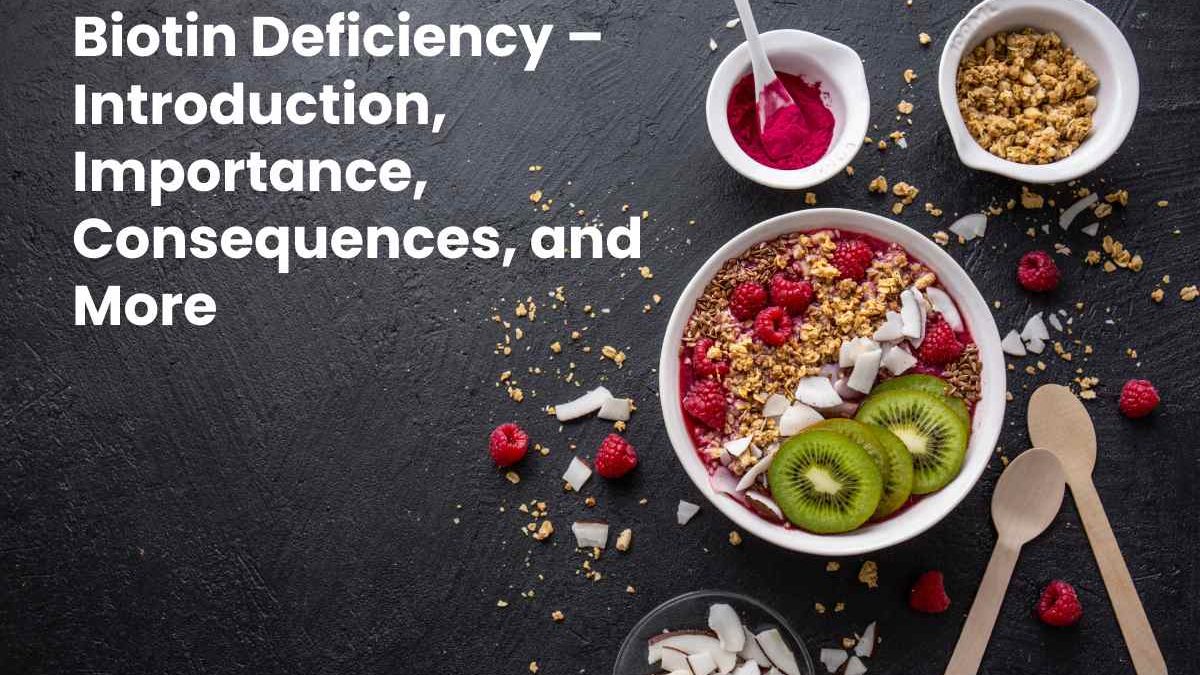Table of Contents
Introduction
Biotin is a vitamin found in foods such as eggs, milk, and bananas. Biotin deficiency can cause thinning hair and rashes on the face. It is an essential part of the body’s enzymes that break down substances such as fats, carbohydrates and others. However, there’s no good test for low biotin levels, so its symptoms usually identify it.
It is also regularly used for hair loss, brittle nails, and other conditions, but no good scientific evidence supports these uses. Biotin supplements may interfere with some laboratory tests. Talk to your doctor if you are taking biotin supplements and need to have a blood test.
How much biotin does your body need?
The necessary dose of vitamin B7 that a person requires varies by age. However, the University of Oregon estimates that the requirement to maintain optimal levels of biotin deficiency is 30 micrograms daily in adults.

Where is vitamin B7 or biotin found?
This vitamin, which is part of the vital group of B vitamins, is present in some foods and in food supplements that you can consume every day to obtain the requirement.
You must have good eating habits that allow you to consume the necessary vitamins, minerals and proteins in your daily diet. Sometimes these are not enough; It may be because we need an extra supply through food supplements, due to situations such as stress, stages of greater physical or mental intensity, or even due to an unbalanced diet, with fast foods or little variety. Although, food is the leading supplier of nutrients that we need for the proper functioning of all our organs.
Many foods can guarantee your supply of vitamin B7 (or biotin), some in more significant proportion than others, such as:
Meats:
among the roots that have a good amount of this vitamin and help you increase biotin levels are pork and organ meats: such as kidneys and liver (especially veal).
Fish:
The fish with the highest vitamin B7 is herring and salmon.
Eggs:
Only the consumption of the egg yolk provides biotin to your body since the white of the egg contains avidin, which is an antinutrient that does not allow the intestine to absorb biotin properly, according to studies carried out by the University of Oregon.*
Dairy:
Milk and cheddar cheese are a source of vitamin B7.
Vegetables:
The most suitable are those with green leaves. Being the most beneficial broccoli, spinach and cauliflower. It is usually recommended to consume them as little cooked as possible since, in this way, they maintain their levels of minerals, fibre and vitamins.
Vegetables:
We can say that from this group, the ones that can help you the most with your daily intake of vitamin B7 are: peas, soybeans, lentils, carrots, broad beans and tomatoes.
Fruits:
The kings of this group that help you with the necessary daily supply of biotin are avocado, bananas, raspberries and strawberries.
Nuts:
Some of them that your body can take better advantage of are walnuts, pistachios, almonds and peanuts.
Other foods that provide this potent vitamin are bread, brewer’s yeast, sunflower seeds and rice bran.
Remember that you must have healthy eating habits to maintain your health in optimal conditions. These must be accompanied by some physical activity that allows you to enjoy life as you deserve. In addition, you can consume daily to complete the nutrients in your diet. Consult with your pharmacist about the most suitable product for you.
Biotin: what foods provide us with it?

Biotin, vitamin B8 or vitamin H, fulfils numerous functions in our physiology, and therefore its deficiency can be important for health. But it is especially appreciated because it is related to weak nails and hair loss since it intervenes in the formation of keratin, the constituent protein of both.
That is why biotin-based supplements have achieved significant commercial popularity, with the idea that by taking them, we will prevent hair loss. However, according to the prestigious American magazine Consumer Reports, a benchmark in the sector, biotin supplements are ineffective in preventing or reversing alopecia.
Although it is true that in individuals with biotin deficiency in the blood plasma, hair thinning and hair loss can occur, which can upturn by restoring levels, supplements would be helpful.
On the other hand, there are not a few sources in nature that can provide us with biotin, so it is advisable to maintain a varied diet where this vitamin predominates instead of taking supplements that could have hypothetical risks.
The importance of biotin.
Biotin is essential in our diet because it participates in the following processes:
- It intervenes in the metabolism of carbohydrates, fats and proteins to obtain glucose molecules, an immediate source of energy for cells.
- Biotin is vital in creating various hormones and synthesising cholesterol.
- It helps control blood sugar levels, which reduces the risk of type 2 diabetes.
- Biotin intervenes in the synthesis of endorphins such as dopamine, serotonin or melatonin, which makes it a good ally against depression and insomnia
- It intervenes in the formation of the skin, being a promoter of collagen synthesis.
- Maintains healthy hair and nails by stimulating keratin synthesis.
- It favours the growth and regeneration of muscles, something very beneficial for people who practice physical exercise.
- It intervenes in the synthesis of the ocular cornea, thus helping the excellent health of the eyes.
Foods that are a source of biotin
For all these reasons, it is vital to maintain good levels of biotin, which achieves if you follow a varied diet that includes the following foods:
However, the liver and viscera are good for eating organ meats since they also provide vitamin A.
- Mushrooms and vegetables are a great source of this vitamin.
- Eggs – Avoid raw eggs, as egg whites can block biotin absorption.
- Fish: mainly white.
- Vegetables.
- Whole grains: Whole grain bread should always prevail.
- Yeast.
- Cabbage.
- Broccoli.
- Potato.
Consequences of biotin deficiency
Although it is infrequent, it can occur in people who abuse alcohol, eat many raw eggs, or have intestinal problems such as Crohn’s disease, irritable bowel, etc. Also, in people with genetic deficiency of B8.
These will show the following symptoms:
- Fine hair with a tendency to fall.
- brittle nails.
- Dry and cracked skin.
- Eye irritation and conjunctivitis.
- Tiredness.
- Depression.
- Insomnia.
Conclusion
Biotin is relatively stable at high temperatures. However, egg white contains an antinutrient, avidin, which acts by stopping its absorption at the intestinal level. Therefore, consuming two or more raw egg whites for long periods can lead to a deficiency of this nutrient.
Fortunately, avidin disables by the consequence of the heat, so to avoid this undesirable result. It is enough always to eat well-cooked eggs. It is possible to benefit from this input of vitamin B8 if you use egg yolks in dishes prepared with heat, such as beating them together with oat flakes and putting the mixture in the microwave to create a highly nutritious dough.

